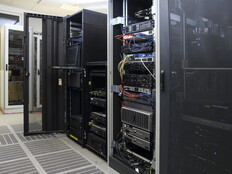Why Not Just Move Your Business to the Cloud?
Hyperconverged infrastructure offers organizations compute power, storage, networking and virtualization all in a single form factor. The cloud offers something similar but is billed as an operational, rather than capital, expense. If the two infrastructure options are so similar, why choose one over the other?
Mike Martell, systems manager at The Dingley Press in Lisbon, Maine, says for him, the decision came down to the need to control uptime.
“We’re a 24/7 operation so our window of tolerance is very low,” he says. “We need the consoles that run our presses working, so we can’t put that functionality in the cloud. Plus, the databases that we sort — 15 million names and address — can’t be in the cloud. If those names are ever breached, we would face billions in fines. We need to make sure everything is tightly secured.”
Scott Sinclair, a senior analyst with the Enterprise Strategy Group, agrees that when making a choice between the cloud and hyperconverged storage, it’s important to understand the evolving performance needs of the specific application environment and how the data is or will be used.
“If something is off-premises, there’s latency when moving data from Point A to Point B,” Sinclair explains. “You might move something and say, ‘No one is using it, so it’s better in the cloud.’ But then 20 people start to use it and it can become expensive, time consuming and a problem if you’ve decommissioned where that data lived internally.”
For more on how organizations are changing their storage strategies, check out our feature, "Real-World Benefits of Hyperconverged Infrastructure."









